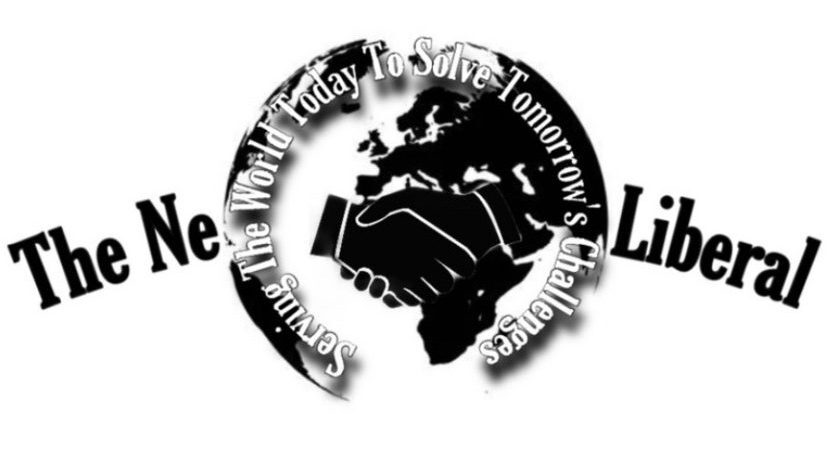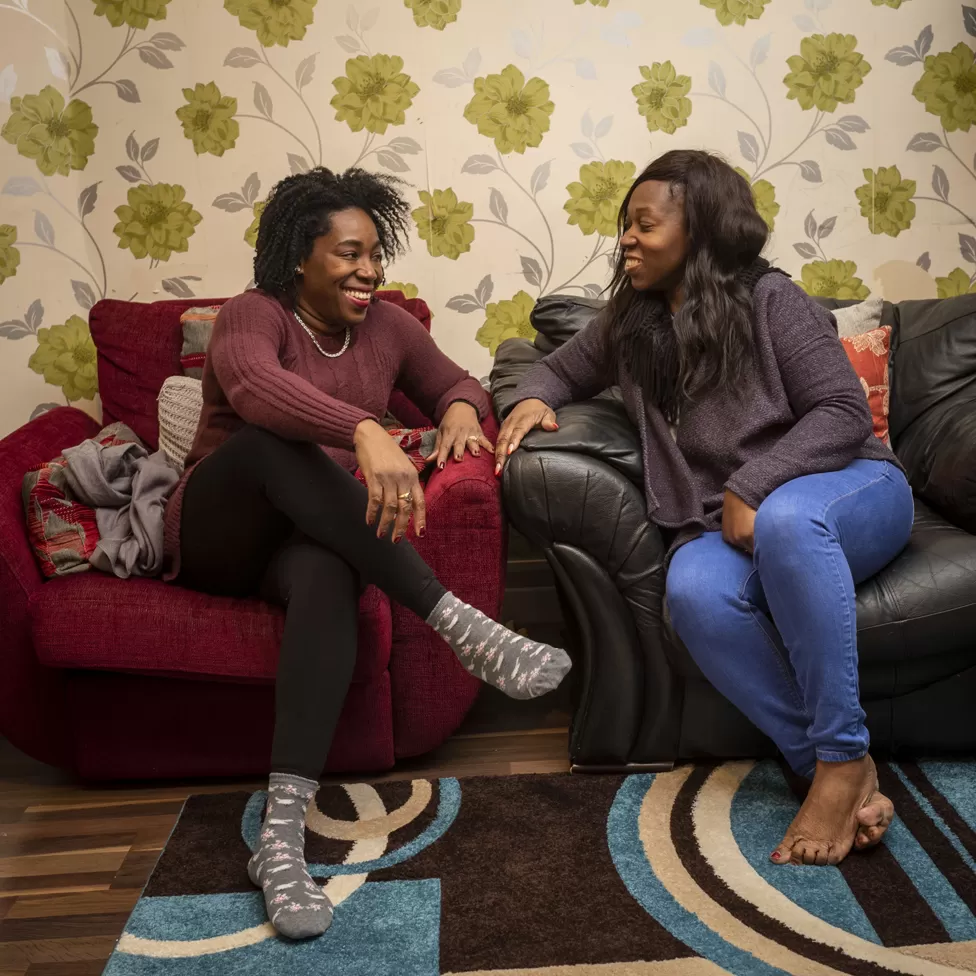Caribbean Diaspora Stories Part 1: My sister Jeannette McKenzie-Taylor in the UK volunteers as a Debt Mentor who is working to relieve debt burdens on single-parent moms. We will have her on The Podcast – The Neoliberal Round for an interview the work of Debt Mentors in the UK. You may read the article on the BBC News A story by Eleanor Briggs entitled: ‘Until I met my debt mentor, I couldn’t always feed my kids’ Published February 20, 2020.
We are here exploring Caribbean Diaspora stories that shows the indomitability of peoples in the world today that are trying to make something out of life stemming from a violent pass of colonization. Dana Berry White explores how we can heal by reinvent and reimagine a better past – Resistance and fight of the slaves who had an individuality beyond what the external defined as property – Price for their pound of flesh. These former livestock are in the 21st century living out their lives as postcolonial subjects within a neo-capitalistic world. Eleanor shows how religious ideology from the global south affects stability for the single-parent mom who must escape the stigma and continue this struggle in the global north. As Fanon said – we are wretched of the earth. Yet with advances in technology and more educated and professional post-colonial peoples, the issue of charity and loves comes back before us. I wrote what will upend violence, it is not Love though sacrifice? What will resolve rampant theft, corruption stemming from the colonized damaged mind? Is it not Charity? So, we explore this help, and charity or benevolence that people like Jeannette McKenzie Taylor, is undertaking as a mentor to help. That’s one of the ways we help to heal and resolve challenges of lack in society. each must play their part and it begins with the sacrifice of love. Jeannette McKenzie is my sister who resides in the UK. She helped to raise me and is currently a Senior Chartered Accountant and Auditor at a major UK firm. The actual story by Eleanor Briggs was also copied and pasted below.
When her oldest daughter left home, Audie had to go part-time in order to be there for her two younger children after school. Previously, she’d made ends meet by working long and unsociable hours. Now she was sinking into debt – and at first there didn’t appear to be a solution.
“If I had one wish it would be to always have food in the house. It’s so hard when my son comes home and says, ‘Mummy, there’s nothing here.’ It’s really hard.”
Audie is a 44-year-old single parent from Barking and Dagenham, in East London. One in 10 residents in the borough owes money to the council, in the form of council tax or rent arrears, and she’s one of them.
Audie had been relying on her oldest daughter for help with childcare, picking up her siblings from school and looking after them while Audie checked stock in a warehouse at night.
But when her daughter turned 16 she moved out, and Audie had to find work that allowed her to spend more time at home. “I couldn’t risk it,” she says.
In her new job, though, she didn’t earn enough to cover her bills, and month by month her debts began to mount.
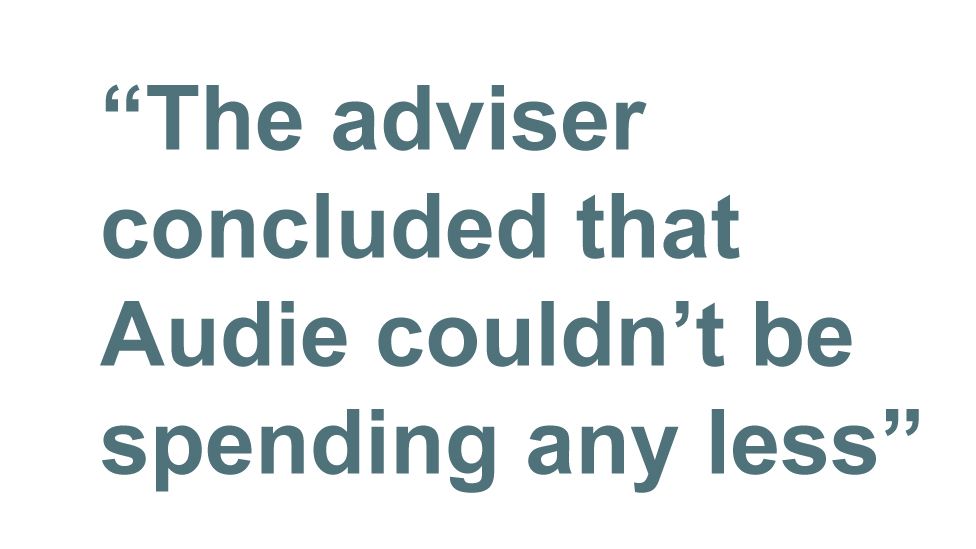
When I met Audie, she’d been called to the council’s Homes And Money Hub in Barking, after receiving a court order to pay her rent arrears.
The HAM Hub, as it’s sometimes called, helps residents maximise their state benefits and provides budgeting advice designed to enable them to pay their debts.
Audie explained that she was a single parent with three children who was now only able to work part-time – an average of 18.5 hours per week.
“I’ve bought a car and I’ve been paying it off for almost four years now. My monthly payment is £285, and my insurance has gone up to £176,” she said.
“I have to get help from my family every week, but it’s a loan that I have to pay back. So once my payment comes in, I have to pay it out. There’s always no money left… I’m living on a day-to-day basis – literally struggling.”
Audie broke down in tears as she admitted she couldn’t always afford to buy food for her children. “I feel like I’m failing them,” she said. Her hunched shoulders revealed the intense financial pressure she’d been under – a burden a single parent bears entirely alone.
At the end of the session, the adviser concluded that Audie couldn’t be spending any less. She left the session stuck in her debt – and with no way out.

Then the BBC introduced Audie to Jeanette McKenzie Taylor.
Like Audie, Jeannette is a mum in her 40s living in Dagenham. When she was younger she also struggled financially – after becoming pregnant at 18, she received no support from her religious parents.
“It was really hard. There were days when I went without lunch,” she says.
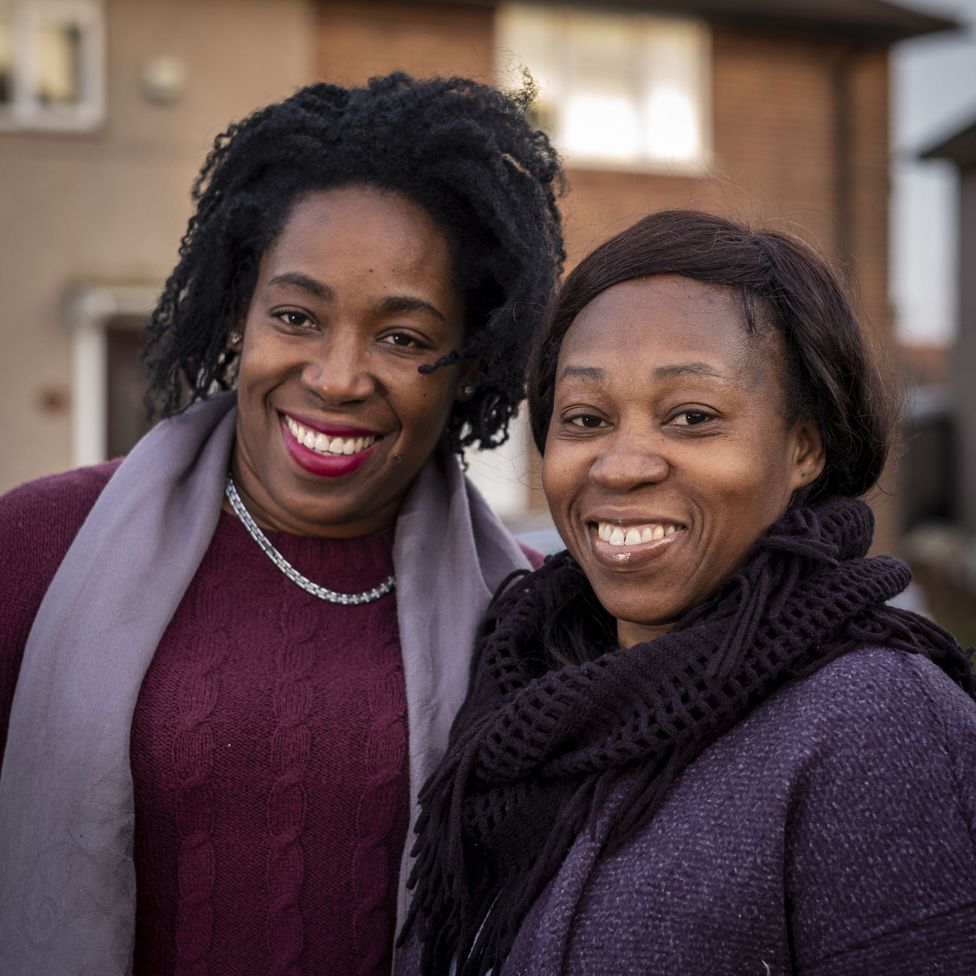
Jeannette vowed not to expand her family until she was in control of her life and her finances. That’s not quite how things worked out. She “still had more children!” she laughs, and even though she had finished her education by this point, there were more tough times ahead.
Today she’s a qualified chartered accountant, and a volunteer for various community initiatives, such as the Community Food Club in Dagenham, which offers a service similar to a food bank. She says her voluntary work has made her realise how many people in her area are in debt
She seemed like the perfect person to understand Audie’s problems and to help her find the solution that the HAM Hub had failed to identify.
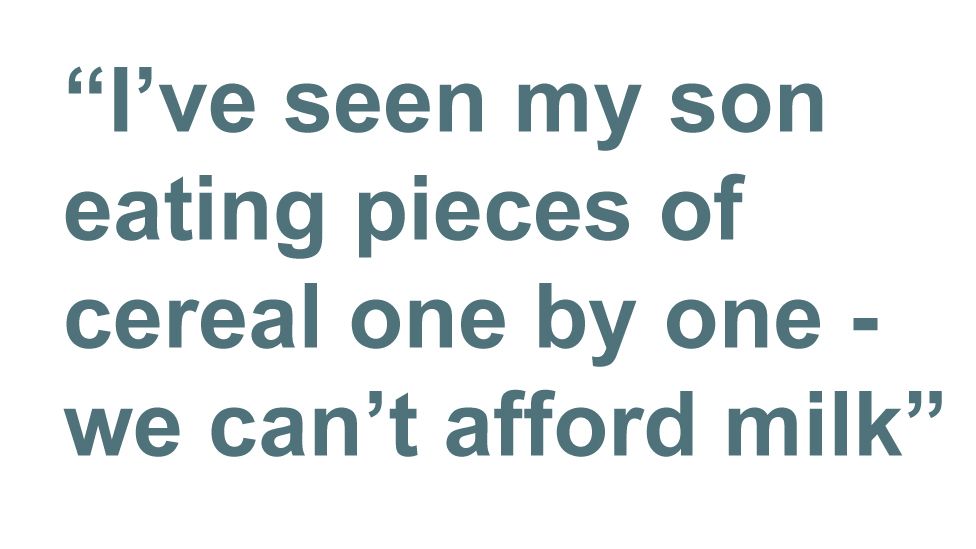
Jeannette and Audie met in early December at Audie’s house in Dagenham. Audie’s car, which altogether costs her more than £450 a month, was parked outside, but at the time she and her family were struggling to eat.
“My daughter’s lost loads of weight, and I have too,” Audie told Jeannette. “I’ve seen my son eating pieces of cereal one by one. We can’t even afford milk.”

The Fix
The Fix, on BBC Radio 4, looks for solutions to some of the UK’s toughest problems, by asking thinkers to come up with ways the problems can be solved, and getting those affected to choose the solution they think will work best.
Chris Naylor, chief executive of the borough of Barking and Dagenham made clear that he was looking for a solution that would break down the taboo around debt and in-work poverty, encourage community cohesion, and could eventually be self-sustaining.
One of the selected ideas was an “I’ve Been There” network – local people who have experienced debt, and who are willing to coach others, informally, on how to get out of it.
If all goes well, Audie could herself be an “I’ve Been There” ambassador in future.
Listen to The Fix: Debt and poverty on BBC Sounds

Jeannette’s first piece of advice was to visit the Community Food Club – no-one had previously mentioned it to Audie.
Then they calculated Audie’s budget, which again showed that she had “only £2 left” at the end of the month, once her car hire purchase, rent, bills, and loans had all been paid. There was a moment of quiet. Jeannette asked Audie how she felt, and Audie took a sharp breath. “It’s horrible,” she admitted sadly, “but I’m not surprised.” Jeannette began to share her own hacks for saving money and getting back into the black when she had been living beyond her means. “I call it my mean period – it’s what I use to recover myself,” Jeannette explained to Audie. “I shop at charity shops, and plan meals.”
Jeannette of course identified Audie’s car as a major drain on her finances. Audie explained that she had bought it on hire purchase as she didn’t have the liquid cash to make a big purchase outright. She will eventually own the car, after paying far more money than if she had paid up front – but if she were to miss a single payment, the car would be taken back, “which would be a huge loss for me”, she said.
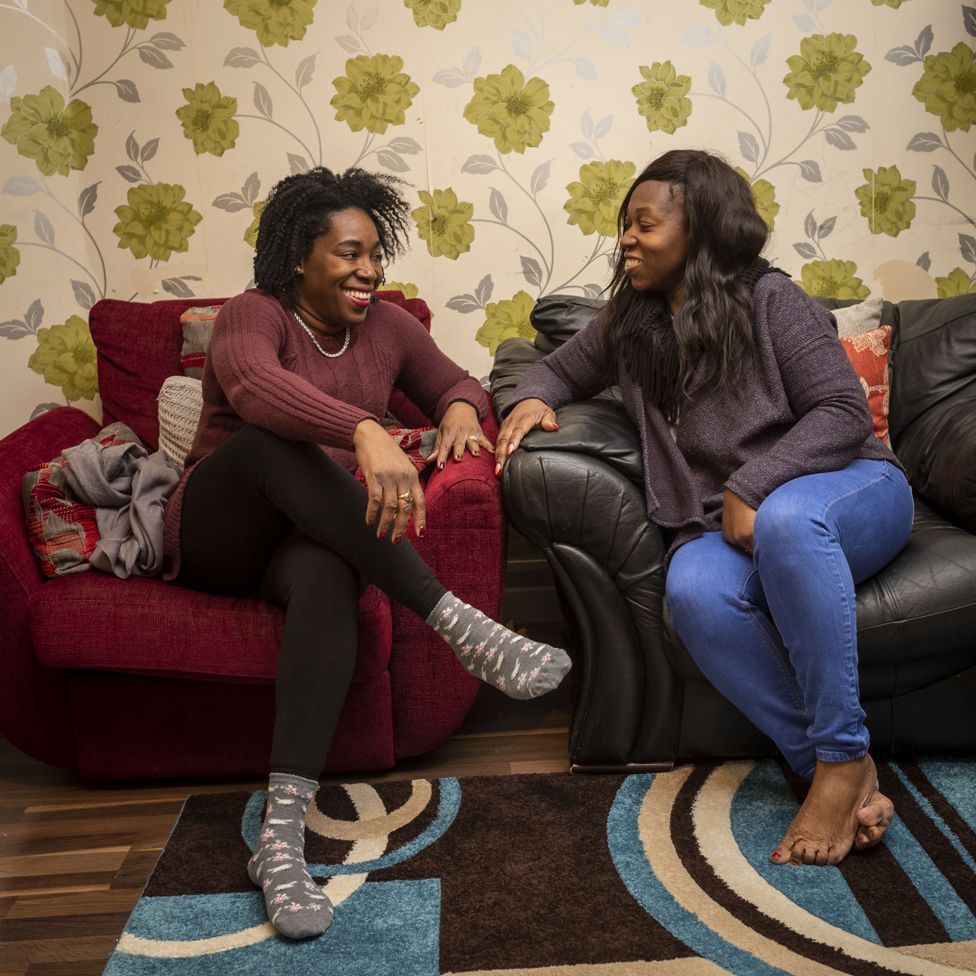
By dividing up outgoings into “needs” and “wants”, Jeannette offered a tool to help Audie distinguish between essential and non-essential expenses. She accepted the car was essential, but when Audie admitted she had been considering upgrading her phone at the end of her contract to give the old one to her daughter, Jeannette grew fiery: “No, she doesn’t need a phone! I would put that in my want category.”
The phone in fact turned out to be a major opportunity for saving. By not upgrading at the end of her contract, and paying just for calls and data, Audie could make an important dent in her monthly outgoings.
It soon became apparent that the two women had more in common than they realized. Jeannette shared tips with Audie on how to cook the Caribbean food they both grew up with. Neck mutton was a cheap alternative to pricey oxtail for Jamaican stews, she pointed out, and grating a carrot in a certain way made it a substitute for the pumpkin noodles used in traditional soup. Audie admitted that it was easy to pay £40 for soup ingredients – too much, under her current circumstances.
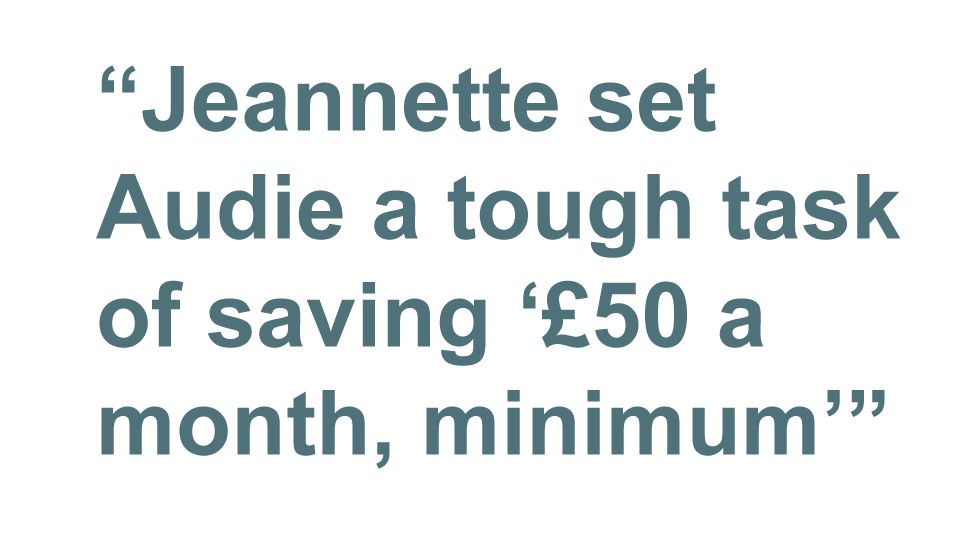
When Audie told Jeannette she hadn’t been able to buy her children any Christmas presents, Jeannette explained her that one year that had happened to her too. “I’ve been there,” she said, advising Audie to “just keep your kids close”. Jeannette then erupted into hoots of laughter as she remembered how her children had surprised their mum and dad with presents under the tree, “by wrapping things we already owned!”
Audie also mentioned that her daughter didn’t have a winter coat because they couldn’t afford one – the 13-year-old had been using her scarf for warmth, and caught a horrible cold as a result. At this point, Jeannette offered to give Audie’s daughter a coat – while also setting Audie a tough target of saving “£50 a month, minimum”. Could she do it?

When I next saw Audie, in the new year, she said that meeting Jeannette had been life-changing.
The two women had kept in touch over Christmas, and Jeannette beamed as Audie revealed the changes she had made. She had chosen not to upgrade her phone, had made use of the Community Food Bank, and had taken one other very important step.
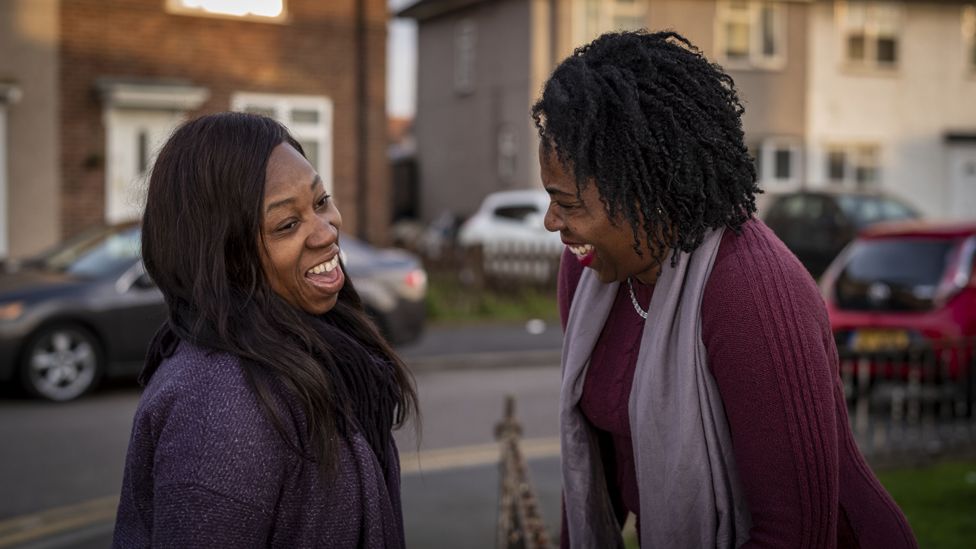
Jeannette had noticed that Audie was working more in some months than in others, which meant the amount of Universal Credit she was receiving was continually going up and down, making budgeting difficult. So, on Jeannette’s advice, Audie had spoken to her boss, and stabilized her working hours.
The upshot was that Audie was now able to save not £50 per month, but £70. All being well, she will also finish paying off her car by the end of this year, meaning that in future she could save much more.
Audie chuckled. Jeannette’s advice and encouragement had given her confidence that she could crack this problem that had previously seemed insoluble.
“Yeah. It may seem small – but to us, it’s really big,” she said. “This experience has made a huge impact on the lives of me and my children.”
If you need help with debt, contact these organisations
Photographs by Phil Coomes
Eleanor Briggs Articles Ends here.
———————————————————————————————————————————————————————————————————
Sometime ago, I did a podcast on The Caribbean Community in Philadelphia, giving back to community. When we think about these contributions in light of immigration today, the value of immigration stemming from “Brain Drain” must quantify and nullify any argument that devalue the immigrant. Brain Drain today is morphing into “Brain Gain.” The gain here is that the drain or loss that Global South countries experience was only in the short-term. Overtime, these immigrants are growing their resources and giving back. Yet, this is not targeted or coordinated and has only devolved into nepotism and propping up a few selfish individuals who squander the gifts. Nevertheless, it is quite a positive thing to relate a story of benevolence and goodwill which may help to inspire and provide a new narrative towards a better way.
Renaldo McKenzie a Doctoral Candidate at Georgetown University but may switch Doctoral programs to University of Pennsylvania. Renaldo is a Lecturer and Author of Neoliberalism, Globalization, Income Inequality, Poverty and Resistance and graduated from The University of Pennsylvania with a Master of Liberal Arts and a Master of Philosophy. Renaldo also studied Philosophy at the University of The West Indies, Mona in Jamaica briefly, before he migrated to the US, where he is now a US citizen residing in Philadelphia. Renaldo is working on Neoliberal Globalization Reconsidered, a second book with contributions from Prof. Emeritus Dr. Martin Oppenheimer. Renaldo is the President of The Neoliberal Corporation.
Error: Contact form not found.
